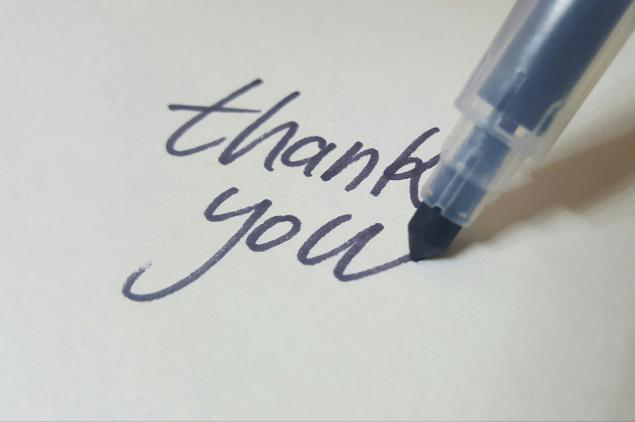7 Best Ways to Say Thank You in Chinese Mandarin
- Date May 21, 2019

Whether you are learning Chinese for business or for personal reasons, it is equally likely that at some point you will need to know how to say thank you in Chinese. There are different ways to go about expressing your gratitude – and you might also want to be able to respond, in turn, to someone who thanks you.
These polite phrases will help you to make a good impression from the very beginning. Learn the different ways to say thank you in Mandarin, so that you are not caught out the next time a host presents you with a gift or provides you with a favor.
List of Ways to Say Thank You
Image by 6072518 on Pixabay
Let’s start off with a list of the ways to say thank you in Mandarin. We will begin by giving the word or phrase in English characters so that you can understand the words more easily. Later on, we will demonstrate how to write thank you in Chinese characters, but don’t worry about that for now. Let’s go through the options.
1. Xiè xiè
This is the simple and basic version of how to say thank you in Chinese. If you are in doubt and you aren’t sure which is the correct to use, this will do fine. At the very worst, your conversational companion may just think you are not aware of the other possible ways to say it – they are unlikely to be offended if they know that you are learning the language. Not only that, but it is also more or less appropriate in almost all situations. The only reason you might feel it is inadequate is if someone has done you a really big favor which requires more gratitude.
2. Duō xiè
This is a less formal way of saying thank you, more like saying a casual thanks in Chinese. It is usually used when texting or using online messaging services because it is a quicker shorthand for thank you in Chinese characters. You can also use it in spoken conversation when you are in a casual situation.
3. Gǎn xiè!
The appropriate translation here would be ‘many thanks!’. It can be used in a semi-formal way, usually when someone has done something that deserves a great deal of gratitude. Perhaps they went out of their way to help you or gave you something that you really wanted. This is to be reserved for times when someone really has made a difference for you. They will probably reply by saying 'You're welcome' in Chinese!
4. Fēi cháng gǎn xiè nǐ!
As you may be able to gather from looking at the sentence construction, this is a longer form of the example above. We can translate it as ‘thank you very much!’. You might prefer to use the longer form in this complete sentence when you want to express the most gratitude possible. You are emphasizing the point that you could not be more thankful by going to the effort of giving the whole phrase. When saying thanks in Chinese, you can even add a bow to strengthen your meaning further.
5. Nǎ li nǎ li!
As well as just saying the Chinese for thank you, you can use other phrases to express gratitude. This phrase means ‘you’re flattering me’ or ‘you’re too kind’ – it’s a playful expression that you can use when someone is giving you a compliment. It’s even considered to be a flirtatious phrase when used in some circumstances, though it does not need to have those connotations.
6. Má fan nǐ le!
Many who hear this phrase may think that it is an apology – it translates to ‘sorry for the trouble’. However, it’s really a more roundabout way of giving thanks. You are acknowledging that the other person has gone to some length to help you or to do something for you, and this lets them know that you appreciate it.
This is a cultural point for China because it is often common to apologize for something rather than to say the Chinese for thank you. For example, where an American host might say “Thank you for waiting”, a Chinese host may say “Sorry to have kept you waiting”.
7. Xiè xiè dà jiā…
If you are addressing a larger group of people, you will want to start your speech by saying ‘thank you all…’ in this way. You should follow it with something specific – like thanking them for attending the event or paying attention to your speech. This is how to say thank you in Chinese for presentations or formal ceremonies.
How to Pronounce Thank You in Mandarin

Be aware that the way you pronounce thank you in Mandarin will be different to the way that you say thank you in Cantonese. This is because there are only four tones in Mandarin, while in Cantonese there can be as many as nine. This makes it more complicated to learn!
If you are already set on learning Mandarin, you can use the notations we have used above as well as the traditional rules of pronunciation to say thank you in Chinese.
In the case of xiè xiè, you must make a hissing sound somewhere between a ‘s’ and a ‘sh’ in English. You should pitch your tone downwards when pronouncing the accented e, making sure to stress each syllable to emphasize the tone. This is difficult for a first-time learner. To get the sound right, place your tongue against the ridge at the back of your lower teeth and try to make an ‘s’ noise. This will create the hiss that you need!
If you learn Chinese in China, you are likely to pick up this pronunciation more quickly. This is because you will be surrounded by native speakers giving you a great example to follow every day. But remember that thank you in Cantonese is different!
Thank You in Chinese Characters
Now let’s look at the Chinese for thank you in written form! Here are the correct characters next to the pronunciation of the expressions of gratitude that we used as our examples above.
- 谢谢 (xiè xiè)
- 多谢 (duō xiè)
- 感谢! (gǎn xiè!)
- 非常感谢你! (fēi cháng gǎn xiè nǐ!)
- 哪里哪里! (nǎ li nǎ li!)
- 麻烦你了! (má fan nǐ le!)
- 谢谢大家… (xiè xiè dà jiā…)
Thank You in Cantonese
Let’s take a diversion from thank you in Mandarin for a moment and look at how to say thank you in Cantonese. This is, of course, a slightly different language. While it may look the same on paper, the specific words and the pronunciation used can often be very different!
If someone has given you a gift and you are speaking Cantonese, you should reply with 多謝 (doh je). This is a very particular usage – note that it should not be used if someone has done you a favor, for example. It is unique to receiving a gift.
If you are thanking someone for a service or a favor, then you should say 唔該 (m goi). This is the correct thing to say to a waiter who has refilled your glass, for example, or to someone who has handed you the file that you need for your meeting.
If you are traveling through China, it can be fun to ask locals about how they would normally say thank you. There can be some regional dialects and phrases which are fun to try!
You’re Welcome in Chinese
If you have mastered the phrases so far, then well done! But now let’s imagine that someone else has given you thanks in Chinese. What would the correct and polite response be?
Just like in English, you will need to say you’re welcome in Chinese to be polite. In most cases, you can simply say 不客气 (bù kèqì). As you can imagine, this translates directly to ‘you’re welcome’. It is used in almost all situations, so you can get away with just having this word in your toolbox to start with.
Later on, you can add 不用谢 (bú yòng xiè). This means something similar to ‘don’t mention it’. It has the same usage and applications as our previous phrase, so feel free to interchange them as you wish.
In more informal situations, you can also try a different form of reply. You could say 小事一桩 (xiǎo shì yī zhuāng) – meaning ‘it’s nothing’. This is a great phrase to use if you are with your friends, but definitely should not be used with your boss or someone you would usually be formal with!
Conclusion
These words and phrases should equip you with all the knowledge that you need in order to express your gratitude, no matter the situation. So long as you are speaking in Mandarin, a simple Xiè xiè will often be good enough to do the job!
Remember that if you are accepting or giving gifts in China, there is another set of rules that you must learn and follow.
If you want to learn to say thank you in Mandarin in a native environment, be sure to take a look at our courses, which will allow you to take Chinese lessons in China! You can contact us today to book your place.
You may also like

Homestay in China: Live, Learn, and Experience Chinese Culture Firsthand

